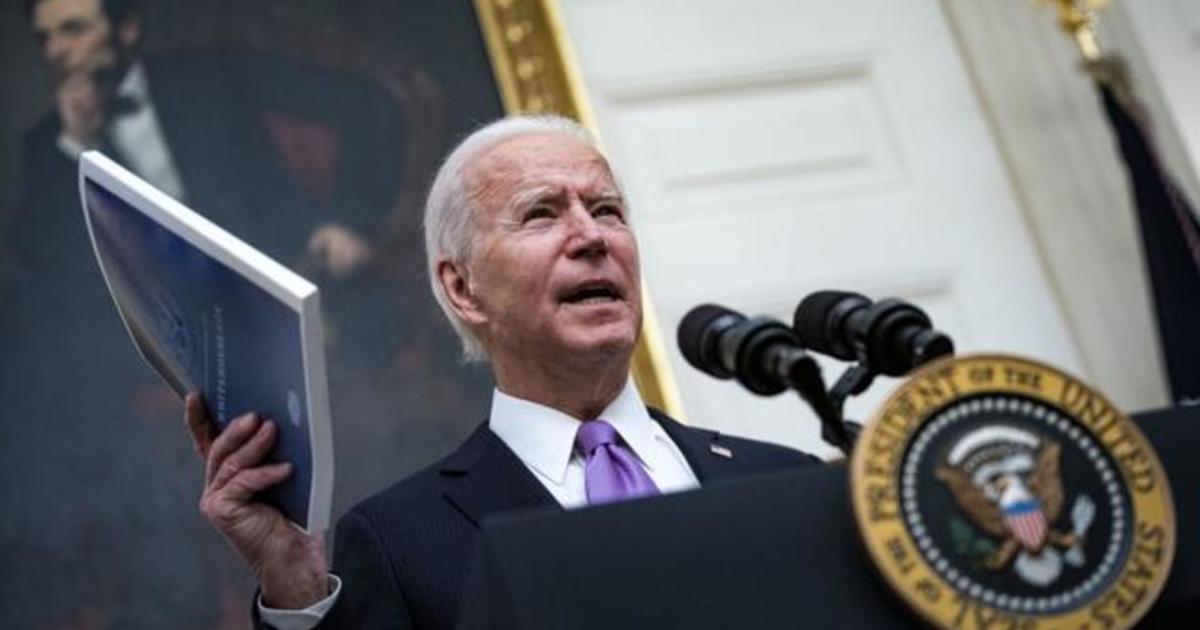
President Biden signed two executive orders on Friday, one of which would increase federal food assistance and streamline the delivery of stimulus checks, as the president attempts to stabilize the economy without congressional assistance amid the fallout from the coronavirus pandemic.
"We have to act now," Mr. Biden said in remarks before he signed the orders. "We cannot, will not, let people go hungry."
Mr. Biden has proposed a $1.9 trillion relief plan to Congress, but it is unclear whether it will garner enough Republican support to pass on a bipartisan basis. Until Congress is able to pass another relief bill, Mr. Biden's actions are intended as stopgap measures to stabilize the economy.
Some Republicans have questioned whether there is still a need for a second, larger relief bill after Congress passed a $900 billion bill in December. But in his remarks on Friday, Mr. Biden said that the most recent relief bill was just a "downpayment."
"We need more action, and we need to move fast," Mr. Biden said. "We're in a national emergency. We need to act like we're in a national emergency. So we've got to move with everything we've got."
In the first order, Mr. Biden asks the U.S. Department of Agriculture to allow states to increase Supplemental Nutrition Assistance Program (SNAP) benefits — commonly known as food stamps — by 15%. Congress recently passed a $1 trillion relief bill that boosted the maximum SNAP benefit by 15%, but that did not help the 40% of SNAP recipients who were already at the maximum benefit. Mr. Biden's order tells the USDA to "consider issuing new guidance that would allow states to increase SNAP emergency allotments for those who need it most," according to a fact sheet provided by the White House, which would mean that an additional 12 million people get enhanced benefits.
The order would also increase Pandemic-EBT, an electronic debit card program for students who would have qualified for free or reduced-price meals at school. Mr. Biden is directing the USDA to "consider issuing new guidance increasing P-EBT benefits by approximately 15% to accurately reflect the costs of missing meals and make it easier for households to claim benefits." According to the White House, this could provide a family with three children an additional $100 in support per month.
Under the order, the USDA would also reassess the Thrifty Food Plan, the basis for determining SNAP benefits. According to the fact sheet from the White House, the plan "is out of date with the economic realities most struggling households face when trying to buy and prepare healthy food."
Due to the economic fallout from the pandemic, more American families have struggled to put food on the table in recent months. The Center on Budget and Policy Priorities, a nonpartisan research institute, reported that nearly one in five adults with children reported that their families sometimes or often didn't have enough to eat in the last seven days according to data collected from the USDA between December 9-21. Black and Latino adults more also more than twice as likely to report that their families did not get enough to eat than White families.
Increasing SNAP benefits would also aid the flailing economy. During an economic downturn, more individuals tend to enroll in SNAP. These enrollees then spend this federal assistance, which in turn generates income for those producing, transporting and selling the food. A 2019 analysis by the USDA Economic Research Service found that a $1 billion increase in SNAP benefits could increase the country's Gross Domestic Product (GDP) by $1.54 billion and support nearly 14,000 jobs.
Mr. Biden's order also aims to streamline the delivery of stimulus checks for those who have not yet received their direct payments. Congress passed a bill to provide $600 in direct payments for Americans earning under a certain threshold last month. Mr. Biden, who supports increasing the payments to $2,000, will also ask Congress to pass legislation providing additional direct checks of $1,400.
Mr. Biden also issued a second executive order to improve collecting bargaining power and protections for federal workers, and direct the Office of Personnel Management to develop recommendations to increase the minimum wage for federal employees to $15 per hour.
U.S. - Latest - Google News
January 23, 2021 at 06:53PM
https://ift.tt/3iEBeDo
Biden signs executive orders on stimulus checks, food stamps and minimum wage - CBS News
U.S. - Latest - Google News
https://ift.tt/2ShjtvN
Shoes Man Tutorial
Pos News Update
Meme Update
Korean Entertainment News
Japan News Update
Bagikan Berita Ini














0 Response to "Biden signs executive orders on stimulus checks, food stamps and minimum wage - CBS News"
Post a Comment